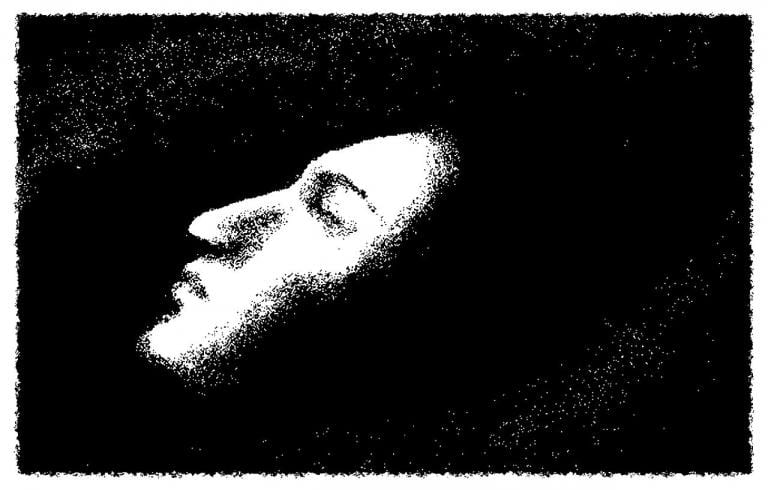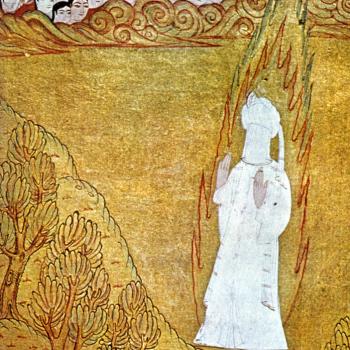
Are we asleep? Mevlana Jalaluddin Rumi can really challenge us on this issue:
This world is a dream—don’t be deluded;
if in a dream a hand is lost, it’s no harm.
In dreams, no real damage is done
if the body is maimed or torn in two hundred pieces.
The Prophet said of this apparently substantial world
that it is but the sleeper’s dream.
You’ve accepted this as an idea,
but the spiritual traveler has beheld this truth with open eye.
You are asleep in the daytime; don’t say this is not sleep.[Masnavi III, 1729; 1732–35][i]
Can we greet our worldly losses in such a way? It is important not to misunderstand Mevlana; we know he experienced the loss of loved ones for whom he grieved deeply, but the above realization transformed his grief. Surely this is possible only if our eyes have been awakened to something beyond what we usually take to be the waking world.
Yet in speaking of wakefulness and sleep, Mevlana is forever wrong-footing us. He switches our perspective in disarming, topsy-turvy ways. For him one of the most important steps in spiritual awakening is falling asleep!
Put your self to sleep and escape from this vain thinking:
then lift up your head into spiritual wakefulness.
[Masnavi VI 4463]
So what parts of us need to fall asleep? We might begin with Book 1 of Mevlana’s Masnavi, which is especially concerned with the nafs al-ammarah, the lowest level of the human psyche with all its bodily desires and egoic compulsions:
Whoever is awake is really asleep,
his wakefulness far worse than any sleep.For if our soul is not awake to God’s Truth,
all our awakenings are closed doors.Vain fancy, the dread of loss and gain and nonexistence
push the soul around all day long.It retains no joy, no grace –
no glory, no tripping along the heavenward Path!He is fast asleep who makes hopeful deals
with fantasies.His wet dream transforms a demon into a woman,
so that, lost in lust, he spills his seed.His semen strewn on barren earth,
he comes only to himself, for fantasy flees.Then he knows the stupor and the body’s taint,
the phantom perceived yet never perceived.[Masnavi I, 412–19][ii]
Though the chosen image specifically invites men to consider their lust for women, the demon stands as a metaphor for any ephemeral object of desire which captures our ego’s fancy (regardless of our gender). Mevlana isn’t threatening us with hellfire or asking us to beat ourselves up about our desires, but asking us to simply pay attention to our inner state and realise that we may already be in hell. For when we are truly awake we realise that hell can often take the form of the spiritual stupor that results from being tyrannized by our desires.
He’s not advocating celibacy or denigrating women. It’s not about eradicating desire, and it’s rare that Mevlana tells us to fight our desire in a confrontational way – his story (in Book III), about the frozen serpent that devours the man who awoke him, makes it clear that we would usually lose such a fight. Instead, he invites us to ‘fall asleep’ to our desire, or (in what amounts to the same thing) let it fall asleep within us. The route to mastery seems to be non-confrontational and touchingly humble in its non-doing. To fight our desire is to give it energy, but to fall asleep is an act of trust – trust that as long as we are making the effort to focus on the one needful thing – remembering God – God will take care of the rest, for only God has the power to do so.
Basic instincts and desires are not the only thing that need to fall asleep within us if we wish to truly awaken. Perhaps we consider ourselves rather intellectual and highly evolved, if so, it may be difficult to accept Mevlana’s demand that our thoughts, inner dialogue, and opinions must also fall asleep in some manner:
With us, one needs to be a waking sleeper,
that in the state of wakefulness,
you may dream dreams.
The thought of created things
is an enemy to this sweet waking sleep;
until your thought is asleep, your throat is shut,
no mysteries can enter.
Mystical bewilderment must sweep thought away;
bewilderment devours thought
and recollection of anything other than God.[Masnavi III, 1114-16]
If Mevlana allows thoughts of the Creator (as opposed to thoughts of ’created’, worldly things), this does not mean the self-regarding thoughts of the theologian which give birth to countless more thoughts and inflate the ego. Again, it requires a humble acknowledgement that we are in our own way; it requires the strength to practice non-doing and non-thinking. Even the most vaunted thoughts of the philosopher or theologian won’t get us there.
In Islam everything in life is symbol, but Mevlana seems to especially wish us to contemplate the symbolic nature of sleep. He frequently refers to the Sleepers in the Cave whose story appears in the Quran (18:9–22). Those sleepers enclosed in a cave are, paradoxically, the epitome of spiritual awakening and true freedom. Addressing God, who mercifully bestows sleep upon humankind, Rumi says:
Every night You free spirits from the body’s snare,
and clear the tablets of the mind.
Every night spirits are set free from this cage,
no longer ruled by rules or long stories.
At night prisoners have no sense of imprisonment,
at night governors are unconscious of their power.
There is no sorrow, no thought of gain or loss,
no tales of this person or another.
Even without sleep this is how the gnostic is.
As God said, You would think they were awake,
while they slept.[iii]
Have no doubt: there are those who are asleep,
day and night, to the affairs of this world,
yet moving like a pen in the hand of God.[Masnavi I: 387–94]
So we have some touchstones here to help us gauge how awake we ourselves may be: Have we allowed our desires to fall asleep to some degree? Are we awake to the stupor we experience when our desires are not asleep enough? How attached are we to our thoughts and opinions? Do we ever experience an inner stillness in which our thoughts subside somewhat? How fixated are we with worldy matters? Are we ever awake to the one needful thing – God’s Truth?
Mevlana hints that eventually our awakening may lead to waking dreams, visions, and mystical bewilderment, for the range of our senses is far greater than we might imagine. According to him, we have far more than the five physical senses commonly thought to be our lot:
Surely the heart is
the seal of Solomon,
and holds the reins of the senses.
Five external senses are easy for it to manage;
five internal senses are also under its control.
There are ten senses and seven limbs of the body:
recount to yourself what isn’t mentioned here.[Masnavi 1, 3575-77]
Of course we have five inner senses: how else could we see, hear, touch, taste, and smell in our dreams? As we awaken, perhaps we will activate these inner senses in our ordinary waking state, and experience the ‘mystic bewilderment’ and waking dreams to which Mevlana refers. However, Mevlana and the teachers who follow his lineage to this day, rarely encourage us to dwell too much on extraordinary spiritual experiences. A more mundane, yet probably more reliable, gauge of our awakening may simply be the degree to which our physical senses have been refined. For Mevlana tells us that as we awaken spiritually our five physical senses will be enhanced by the light of God:
The sensuous eye is a horse;
the light of God is the rider:
without the rider the horse is useless.
The light of God rides the body’s eye.
The soul yearns for God.
God’s light enhances the senses.
This is the meaning of Light upon Light.[Masnavi II, 1286, 1290–93]
‘Light upon light’ is a phrase from the Quran (24:35) and Mevlana offers a wonderful interpretation. Surely one sign of genuine awakening is a greater appreciation of beauty, especially in nature, art, and human relationship. We begin to sense the light of God everywhere. Could it be that our five physical senses are spiritualised by the activation of our five inner senses, without our necessarily being aware of it?
Mevlana offers us another gem which helps us not only assess the degree of our spiritual awakening, but may also help us know how and when our efforts meet with God’s approval. It affirms the concept that the spiritual path is essentially concerned, not with ‘spiritual’ experiences or knowledge, but simply with refinement of character and contentment with what is:
Even though God doesn’t nod His head at you,
He gives you an inner delight
worth more than two hundred gestures of approval.
Anyway, that’s how Intellect and Spirit give a nod:
if you sincerely serve the Loving Mind,
that’s how it acknowledges your service—
your virtue grows.[Masnavi IV 3483–86]
Do we have this inner delight and has our virtue grown?
Finally, whilst Mevlana is primarily concerned with awakening us to the tyrant within ourselves, it feels important to mention that his stories and fables may also awaken us to tyrannies in our outer world, pricking our social conscience and even activating us politically. The true dervish is not concerned solely with his own personal awakening. For instance, in his essay ‘The Contemporary Relevance of Rumi’s Language of the Soul’,[iv] Kabir Helminski demonstrates how ‘The fable of the Lion and the Hare, which is found early in the first book of his Mathnawi, provides an excellent illustration of the contemporary relevance of Rumi’s thought to some of the social and political problems that plague the modern world.’ Likewise, the story of how a conspiracy went to astonishing lengths to undermine the early Christian community from within (also at the beginning of Book 1), might make us pause to consider what false realities may be manipulating us in our own age.
In this regard, perhaps these verses from Mevlana may resonate. We are:
…like someone who awakes and springs up, still drowsy,
and then is lulled back to sleep by the suggestion of an evil nurse:
“Go to sleep, my darling, I won’t let anyone disturb your slumber.”[Masnavi VI, 588–89]
The degree to which we can think independently outside the narratives of our media, government, and culture – whether they are inciting us to misplaced fear or misplaced trust – is perhaps also indicative of the level of our spiritual awakening.
Yet whereas our individual capacity to encompass the complexities of the world is severely limited, our individual capacity to understand ourselves is almost limitless – and also provides a reliable mirror for some insight into that outer world. ‘To know yourself is to know your Lord’: Sufis like to remind themselves of these words of Muhammad. We might put a spin on this and say, ‘To awaken to yourself is to awaken to the world.’ Or, flipping it like Mevlana, say, ‘To awaken to yourself is to fall asleep to the world.’
[i] Unless otherwise stated, all quotations from Rumi are translated by Kabir and Camille Helminski.
[ii] Rendered by the author from translations by Nicholson and Williams.
[iii] These words are from the Quran (18:18).
[iv] From The Philosophy of Ecstasy: Rumi and the Sufi Tradition, ed. by Leonard Lewisohn, World Wisdom.
















